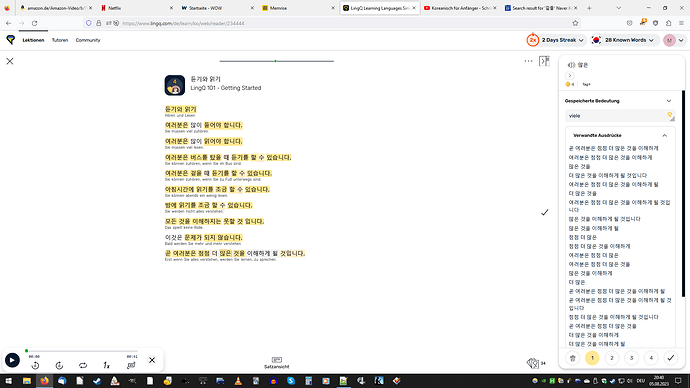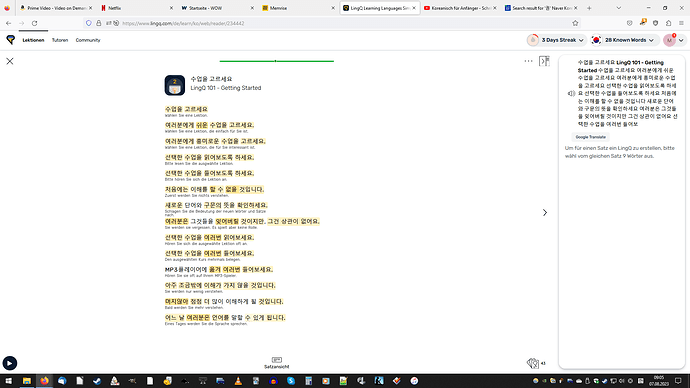In the fourth lesson of the korean course “LingQ 101 - Getting started” is a minor issue. One sentence got skipped “아침시간에…” (sentence #6) and the last sentence in the german text is a translation of a sentence that seems to be missing in the korean text.
Thanks, we will have it fixed.
Found another one that I’ve missed on the first run. It’s the same course, lesson #2.
-The translation of sentence #9 is missing, below it is the translation of sentence #10. (선택한 … 읽어보세요.)
-Below sentence #10 is a translation of sentence not occouring in the text (although it would fit the content, so maybe it got lost). (선택한 … 들어보세요.)
Thanks! We will fix it.
And another one ![]()
In lesson #10 of the same course, the first sentence contains a typo. It says “Tutor warden” instead of “Tutor werden”.
On another note: The translations sometimes switch between formal and informal addressing, so sometimes it says “Sie” and sometimes “Du”. It’s not a huge deal but odd to read.
Started with the short stories (“LingQ Mini Stories”)
First story (“민주는 요리사입니다”)
There is a typo on the first page in the last sentence. It reads 삽십, but should be 삼십.
The Name 민수 is translated with Markus.
Thanks we will fix it.
There is an issue with the audio karaoke mode in short stories korean course for germans. In the 9th story, the 5th sentence is hilighted when the 4th is read and when the 8th sentence is read, nothing is hilighted (making it synced again).
So “그는 마트에 간다.” is not hilighted, the hilighting is on sentence further.
Beginning with “결국 그는 가게를 나간다.” it is back in sync.
In the same story there is a translation issue. In the 8th sentence 샐러드 is translated with “Süßigkeiten” (sweets) instead of “Salat” (salad). It is the same in the 4th sentence on the second page (basically the same sentence just in first person).
The answer for the second question is also wrong (and doesn’t even make sense).
All stories thus far replace the names with western ones. This is unnecessary and extremely confusing. It also hinders getting used to them so one can at least get a feeling for whether the person is male or female. In this story, the conversion was also partially forgotten, so sometimes the persons have korean names and sometimes western ones.
There is an oddity in the 36th korean mini story.
Question #7 reads: “영진씨의여동생은치과의사가되기위한어떤공부를시작하게되나요?”
The translation says “Was wird Philips Schwester beginnen zu studieren?” (“What is Philip’s sister going to study?”
There are two things:
The first is that parts of the sentence are not translated at all. A more suiting translation might be “Was wird Yeonjin’s Schwester beginnen zu studieren, um Zahnärztin zu werden?” (“What is Yeonjin’s sister going to study in order to become a dental doctor?”) The italic part is missing in the original translation.
The second oddity is the answer: “영진씨의여동생은치과의사가되기위한공부를시작할겁니다.” Here, what is translated as “Zahnärztin” before, is now translated with “Zahnmedizin”. I get that Koreans might use the same term for both, but then the whole question+answer sounds odd, as the answer is already provided in the question (at least in korean). Maybe the short stories are standarized (I haven’t checked on other languages yet)?!

